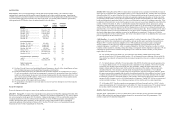Dish Network 2012 Annual Report Download - page 20
Download and view the complete annual report
Please find page 20 of the 2012 Dish Network annual report below. You can navigate through the pages in the report by either clicking on the pages listed below, or by using the keyword search tool below to find specific information within the annual report.
28
28
In addition, our competitive position depends in part on our ability to offer new subscribers and upgrade existing
subscribers with more advanced equipment, such as receivers with DVR and HD technology and by otherwise
making additional infrastructure investments, such as those related to our information technology and call centers.
Furthermore, the continued demand for HD programming continues to require investments in additional satellite
capacity. We may not be able to pass on to our subscribers the entire cost of these upgrades and infrastructure
investments.
New technologies could also create new competitors for us. For instance, we face increasing consumer demand for
the delivery of digital video services via the Internet, including providing what we refer to as “DISH Anywhere.”
We expect to continue to face increased threats from companies who use the Internet to deliver digital video services
as the speed and quality of broadband and wireless networks continues to improve.
Technological innovation is important to our success and depends, to a significant degree, on the work of technically
skilled employees. We rely on EchoStar to design, develop and manufacture set-top boxes with advanced features
and functionality and solutions for providing digital video services via the Internet. If EchoStar is unable to attract
and retain appropriately technically skilled employees, our competitive position could be materially and adversely
affected. In addition, delays in the delivery of components or other unforeseen problems associated with our
technology may occur that could materially and adversely affect our ability to generate revenue, offer new products
and services and remain competitive.
We rely on a single vendor or a limited number of vendors to provide certain key products or services to us such
as information technology support, billing systems, and security access devices, and the inability of these key
vendors to meet our needs could have a material adverse effect on our business.
Historically, we have contracted with a single vendor or a limited number of vendors to provide certain key products
or services to us such as information technology support, billing systems, and security access devices. If these
vendors are unable to meet our needs because they fail to perform adequately, are no longer in business, are
experiencing shortages or discontinue a certain product or service we need, our business, financial position and
results of operations may be adversely affected. While alternative sources for these products and services exist, we
may not be able to develop these alternative sources quickly and cost-effectively which could materially impair our
ability to timely deliver our products to our subscribers or operate our business. Furthermore, our vendors may
request changes in pricing, payment terms or other contractual obligations between the parties, which could cause us
to make substantial additional investments.
Our sole supplier of new set-top boxes, EchoStar, relies on a few suppliers and in some cases a single supplier,
for many components of our new set-top boxes, and any reduction or interruption in supplies or significant
increase in the price of supplies could have a negative impact on our business.
EchoStar relies on a few suppliers and in some cases a single supplier, for many components of our new set-top
boxes that we provide to subscribers in order to deliver our digital television services. Our ability to meet customer
demand depends, in part, on EchoStar’s ability to obtain timely and adequate delivery of quality materials, parts and
components from suppliers. In the event of an interruption of supply or a significant price increase from these
suppliers, EchoStar may not be able to diversify sources of supply in a timely manner, which could have a negative
impact on our business. Further, due to increased demand for products, many electronic manufacturers are
experiencing shortages for certain components. EchoStar has experienced in the past and may continue to
experience shortages driven by raw material availability, manufacturing capacity, labor shortages, industry
allocations, natural disasters, logistical delays and significant changes in the financial or business conditions of our
suppliers that negatively impact our operations. Any such delays or constraints could have a material adverse effect
on our business, financial condition and results of operations, including, among other things, our gross new
subscriber activations.
29
29
Our programming signals are subject to theft, and we are vulnerable to other forms of fraud that could require us
to make significant expenditures to remedy.
Increases in theft of our signal or our competitors’ signals could, in addition to reducing new subscriber activations,
also cause subscriber churn to increase. We use microchips embedded in credit card-sized cards, called “smart
cards” or Security Access Devices.
Our signal encryption has been compromised in the past and may be compromised in the future even though we
continue to respond with significant investment in security measures, such as Security Access Device replacement
programs and updates in security software, that are intended to make signal theft more difficult. It has been our
prior experience that security measures may only be effective for short periods of time or not at all and that we
remain susceptible to additional signal theft. During 2009, we completed the replacement of our Security Access
Devices and re-secured our system. We expect additional future replacements of these devices will be necessary to
keep our system secure. We cannot ensure that we will be successful in reducing or controlling theft of our
programming content and we may incur additional costs in the future if our system’s security is compromised.
We are also vulnerable to other forms of fraud. While we are addressing certain fraud through a number of actions,
including terminating retailers that we believe violated DISH Network’s business rules, there can be no assurance
that we will not continue to experience fraud which could impact our gross new subscriber activations and
subscriber churn. Sustained economic weakness may create greater incentive for signal theft and other forms of
fraud, which could lead to higher subscriber churn and reduced revenue.
We depend on third parties to solicit orders for our services that represent a significant percentage of our total
gross new subscriber activations.
Most of our retailers are not exclusive to us and some of our retailers may favor our competitors’ products and
services over ours based on the relative financial arrangements associated with marketing our products and services
and those of our competitors. Furthermore, most of these retailers are significantly smaller than we are and may be
more susceptible to sustained economic weaknesses that make it more difficult for them to operate profitably.
Because our retailers receive most of their incentive value at activation and not over an extended period of time, our
interests may not always be aligned with our retailers. It may be difficult to better align our interests with our
resellers’ because of their capital and liquidity constraints. Loss of these relationships could have an adverse effect
on our subscriber base and certain of our other key operating metrics because we may not be able to develop
comparable alternative distribution channels.
We have limited owned and leased satellite capacity and failures or reduced capacity could adversely affect our
business.
Operation of our programming service requires that we have adequate satellite transmission capacity for the
programming we offer. Moreover, current competitive conditions require that we continue to expand our offering of
new programming. While we generally have had in-orbit satellite capacity sufficient to transmit our existing
channels and some backup capacity to recover the transmission of certain critical programming, our backup capacity
is limited.
Our ability to earn revenue depends on the usefulness of our satellites, each of which has a limited useful life. A
number of factors affect the useful lives of the satellites, including, among other things, the quality of their
construction, the durability of their component parts, the ability to continue to maintain proper orbit and control over
the satellite’s functions, the efficiency of the launch vehicle used, and the remaining on-board fuel following orbit
insertion. Generally, the minimum design life of each of our satellites ranges from 12 to 15 years. We can provide
no assurance, however, as to the actual useful lives of the satellites. Our operating results could be adversely
affected if the useful life of any of our satellites were significantly shorter than the minimum design life.
























